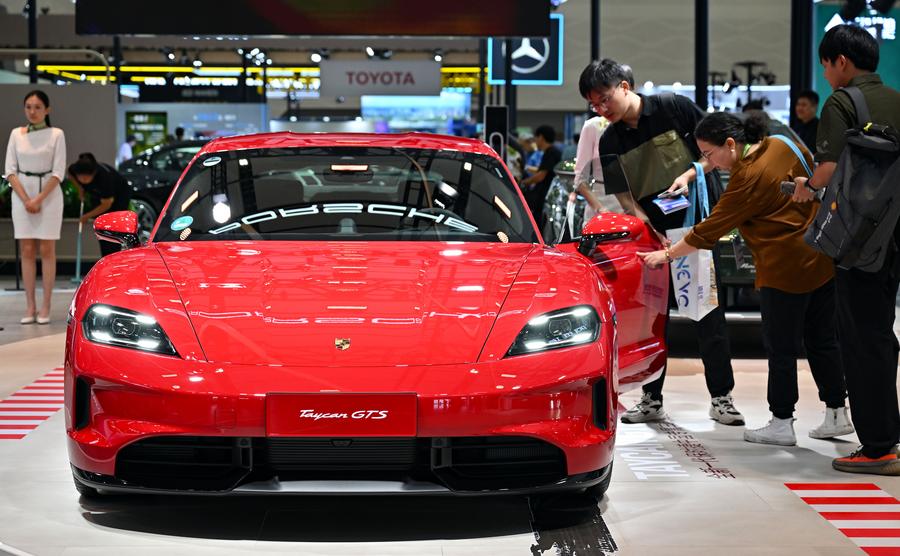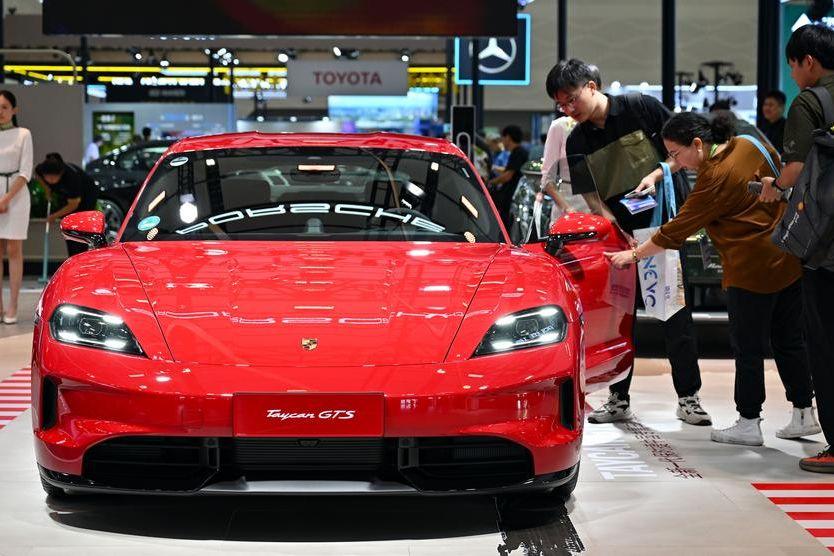
Visitors view a new energy vehicle of Porsche during the 2025 World New Energy Vehicle Congress (WNEVC 2025) in Haikou, south China's Hainan Province, Sept. 27, 2025. (Xinhua/Guo Cheng)
BEIJING, Oct. 10 (Xinhua) -- As the global automotive industry continues to grow, collaboration between China's automotive supply chain and international businesses is deepening. Industry insiders believe that there is vast potential for cooperation between China and the world, calling for enhanced cooperation between domestic and international carmakers to advance the sector's transformation and upgrading.
-- Sustained growth in global new energy vehicle sector
The global new energy vehicle (NEV) market maintains steady growth, while the automotive industries in both China and the world are transitioning toward greener and smarter development.
Data from the Ministry of Industry and Information Technology showed that China's NEV production and sales in 2024 surged to 9.5 times the 2020 full-year total. With the annual production exceeding 13 million units last year, China has topped the world in NEV production and sales for ten consecutive years.
Meanwhile, the global NEV market continues to grow. A report by China International Capital Corporation (CICC) points out that global consumer awareness has been built on the electric-intelligent transformation since 2012. Automakers in the United States, Japan, Europe and other overseas markets are expected to achieve large-scale rollouts of NEV models by 2027.
In addition, many countries are further boosting the development of their NEV industries. Hildegard Müller, president of the German Association of the Automotive Industry, stated at the 2025 World New Energy Vehicle Congress that both China and Germany have made significant progress in e-mobility.
-- Intensified cooperation among Chinese and foreign enterprises
Amid the ongoing expansion of the NEV sector, overseas carmakers are increasingly partnering with Chinese brands, elevating cooperation across multiple domains. Notably, China's R&D ecosystem is drawing attention from foreign-invested enterprises.
According to the Business Confidence Survey Report 2024/2025 released by the German Chamber of Commerce in China, 70 percent of surveyed companies expect further growth in China's automotive industry over the next five years.
In recent years, China's cooperation with foreign countries in the field of NEVs has become increasingly close, with more exchanges and cooperation in technology, market access, and policy frameworks, noted Wu Zhen, president of Magna China.
-- Stronger global synergy required for industrial upgrade
Multiple industry insiders have stressed the need to deepen integration and foster synergy between the Chinese and foreign NEV sectors, so as to chart a green, smart and sustainable course for the industry.
Wang Xiaojuan, president of Geely's External Collaboration Research Institute, stated that combining China's distinct strengths in supply chain transformation, cost efficiency, and economies of scale with Europe's profound legacy in manufacturing creates great complementarity and mutual benefits.
Moreover, talent cultivation, which serves as a key pillar of the industry, also requires closer cooperation. Collaboration between academia and industry is essential to the cultivation of automotive engineers equipped for the new era, said Chris Mason, CEO of the International Federation of Automotive Engineering Societies (FISITA).
(Edited by Yang Linlin with Xinhua Silk Road, linlinyanglyn@163.com)




 A single purchase
A single purchase









